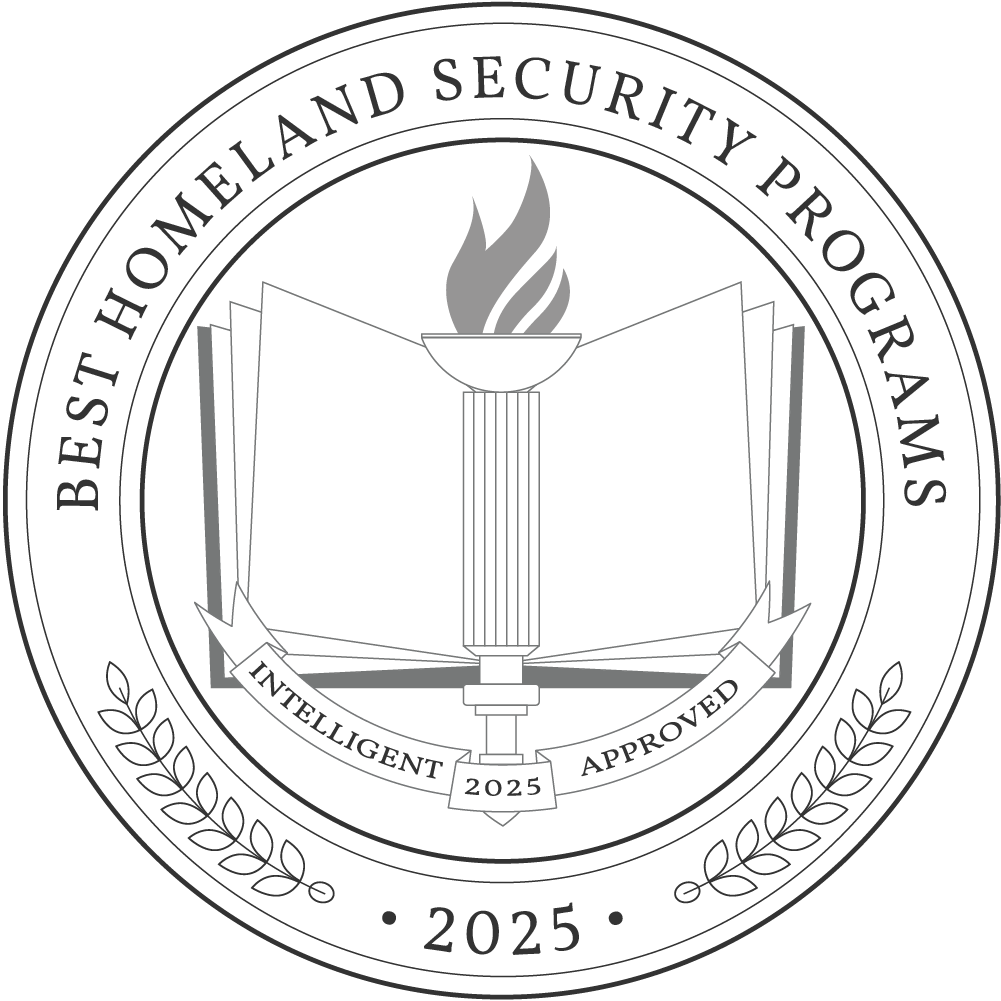A homeland security degree prepares students for a career in threat assessment, analysis, and response. Students learn to master risk management and assess environmental hazards.
Graduates can apply their studies to a career in the private or public sector in any one of more than 20 government agencies, including the Federal Emergency Management Agency (FEMA), U.S. Customs and Border Protection, the Postal Service, and the Transportation Security Administration.
The average salary for graduates ranges from $83,960 for emergency management directors, $111,930 for criminal investigators, and $120,360 for information and security analysts.
A homeland security degree can take four years of full-time enrollment to complete the required 120 credits. The average yearly tuition is $14,688, with cost differences between private, public, and two-year and four-year institutions.
Why Trust Us
The Intelligent.com Higher Education Team is dedicated to providing students with independent, equitable school and program rankings and well-researched resources. Our expert-driven articles cover topics related to online colleges and programs, paying for school, and career outlooks. We use data from the U.S. Department of Education’s College Scorecard, the National Center for Education Statistics, and other reputable educational and professional organizations. Our academic advisory team reviews content and verifies accuracy throughout the year for the most current information. Partnerships do not influence rankings or editorial decisions.
- Analyzed over 2,000 national, accredited, and nonprofit colleges and universities
- 800+ rankings pages are reviewed and updated yearly
- Content is informed by reputable sources, surveys, and interviews with academic advisors and other experts
- Over 100 data points are reviewed for accuracy and quality throughout the year, including sources
How we rank schools
Our list features the best Homeland Security degree programs at top colleges nationwide. Each school featured is a nonprofit, accredited institution — either public or private — with a high standard of academic quality for post-secondary institutions.
We evaluated each school’s program on tuition costs, admission, retention and graduation rates, faculty, reputation, and the student resources provided for online students. We collected data from trusted sources like the National Center for Education Statistics, individual school and program websites, school admissions counselors, and other data sources. Then, we calculated the Intelligent Score on a scale of 0 to 100 based on the following criterion:
Academic Quality:
- Admission rate versus enrollment rate
- Retention rate of students who return after year one
- Accreditation status (regional and programmatic)
- Nonprofit status, both private and public institutions
Graduation Rate
- Overall graduation rate
- Total number of currently enrolled students, including diversity metrics
- Student-to-faculty ratio
Cost and ROI
- In-state and out-of-state per-credit tuition rates and fees
- Required credits to graduate
- Earning potential after graduation
- Availability of federal student loans, scholarships, and other financial aid options
Student Resources
- Available student services for online-only and hybrid programs
- On-campus amenities like tutoring centers and the number of libraries
Read more about our ranking methodology.
Best 19 Accredited Homeland Security Degree Programs
FiltersInstitution Type
Status
- Intelligent Score
- Alphabetically By University Name
- Acceptance Rate
- Enrollment
- In-state Graduate Tuition
- Out-of-state Graduate Tuition
- In-state Undergraduate Tuition
- Out-of-state Undergraduate Tuition

University at Albany
Intelligent Score: 98.34In-state: $7,070
Out-of-state: $16,980
In-state: $11,310
Out-of-state: $11,310
SAT: 860-1060
ACT: N/A
Resident: $389
Non-Resident: $1,163
On-Campus, Online
Middle States Commission on Higher Education.
120

Virginia Commonwealth University
Intelligent Score: 96.43In-state: $12,179
Out-of-state: $32,827
In-state: $12,703
Out-of-state: $12,703
SAT: 1060-1250
ACT: 21-28
In-State: $428
Out-of-State: $1,158
On-Campus
Southern Association of Colleges and Schools Commission on Colleges
120

Eastern Kentucky University
Intelligent Score: 94.73In-state: $9,266
Out-of-state: $19,338
In-state: $9,900
Out-of-state: $9,900
SAT: 950-1170
ACT: 19-25
Resident: $410
Non-Resident: $446
On-Campus, Online
Southern Association of Colleges and Schools Commission on Colleges
120

Embry - Riddle Aeronautical University
Intelligent Score: 94.44In-state: $36,456
Out-of-state: $36,456
In-state: $18,228
Out-of-state: $18,228
SAT: 1140-1320
ACT: 23-29
$1,767
On-Campus, Online
Southern Association of Colleges and Schools Commission on Colleges
123

SUNY College of Technology at Canton
Intelligent Score: 92.23In-state: $7,070
Out-of-state: $16,980
In-state: $11,310
Out-of-state: $11,310
SAT: 860-1060
ACT: N/A
Resident: $295
Non-Resident: $729
On-Campus
Middle States Commission on Higher Education
123

Idaho State University
Intelligent Score: 91.75In-state: $5,928
Out-of-state: $22,550
In-state: $7,982
Out-of-state: $7,982
SAT: N/A
ACT: N/A
Resident: $343
Non-Resident: $774
On-Campus
Northwest Commission on Colleges and Universities
120

Sul Ross State University
Intelligent Score: 91.17In-state: $6,547
Out-of-state: $18,817
In-state: $4,162
Out-of-state: $4,162
SAT: 850-1047
ACT: 15-21
$309
On-Campus
Southern Association of Colleges and Schools Commission on Colleges
120

University of New Hampshire
Intelligent Score: 90.76In-state: $15,520
Out-of-state: $32,860
In-state: $14,170
Out-of-state: $14,170
SAT: 1090-1280
ACT: 24-30
Resident: $630
Non-Resident: $1,450
On-Campus
New England Commission of Higher Education
128

Mercy University
Intelligent Score: 90.76In-state: $40,712
Out-of-state: $40,712
In-state: $47,865
Out-of-state: $47,865
SAT: 1020-1230
ACT: 23-27
$924
On-Campus
Middle States Commission on Higher Education
120

Slippery Rock University of Pennsylvania
Intelligent Score: 90.62In-state: $53,166
Out-of-state: $53,166
In-state: $37,678
Out-of-state: $37,678
SAT: 1460-1570
ACT: 33-35
Resident: $322
Non-Resident: $644
On-Campus
Middle States Commission on Higher Education
121

Tulane University of Louisiana
Intelligent Score: 90.09In-state: $54,766
Out-of-state: $54,766
In-state: $59,090
Out-of-state: $59,090
SAT: 1340-1500
ACT: 30-33
$623
On-Campus
Southern Association of Colleges and Schools Commission on Colleges
120

Northeastern State University
Intelligent Score: 90.05In-state: $5,913
Out-of-state: $14,313
In-state: $4,500
Out-of-state: $4,500
SAT: 955-1125
ACT: 17-24
Resident: $220
Non-Resident: $524
On-Campus
Higher Learning Commission
124

Monmouth University
Intelligent Score: 89.84In-state: $39,968
Out-of-state: $39,968
In-state: $27,874
Out-of-state: $27,874
SAT: 1040-1210
ACT: 21-26
$1,469
On-Campus
Middle States Commission on Higher Education
120

North Carolina Central University
Intelligent Score: 89.60In-state: $3,728
Out-of-state: $16,435
In-state: $4,740
Out-of-state: $4,740
SAT: 850-1010
ACT: 15-19
In-State: $155
Out-of-State: $698
On-Campus
Southern Association of Colleges and Schools Commission on Colleges
120

Campbell University
Intelligent Score: 86.03In-state: $34,290
Out-of-state: $34,290
In-state: $14,003
Out-of-state: $14,003
SAT: 1010-1210
ACT: 19-25
$785
On-Campus, Online
Southern Association of Colleges and Schools Commission on Colleges
124

Keiser University
Intelligent Score: 84.67In-state: $19,808
Out-of-state: $19,808
In-state: $27,162
Out-of-state: $27,162
SAT: N/A
ACT: N/A
$979 - $1,469
On-Campus
Southern Association of Colleges and Schools Commission on Colleges
120

DeSales University
Intelligent Score: 81.31In-state: $38,500
Out-of-state: $38,500
In-state: $20,520
Out-of-state: $20,520
SAT: 1010-1240
ACT: 22-28
$560
On-Campus, Online
Middle States Commission on Higher Education
120

National University
Intelligent Score: 80.94In-state: $13,320
Out-of-state: $13,320
In-state: $15,480
Out-of-state: $15,480
SAT: N/A
ACT: N/A
$555
On-Campus, Online
Western Association of Schools and Colleges
180
How to Choose a Homeland Security Degree Program
Choose your area of study
Your career and personal goals will influence the type of program you choose. A homeland security degree offers a variety of career choices, depending on your goals and interests, including:
- Emergency management
- Organizational security
- Intelligence analysis
- Information security analysis
- Cyber crime investigation
Degree options within homeland security studies include a Bachelor of Science or Bachelor of Arts in homeland security or a Bachelor of Science in public service and public policy, with a concentration in homeland security and emergency management. Some institutions offer dual degree options for a bachelor’s and master’s degree.
Research schools and programs
As you research your options, focus on accredited institutions. Accrediting bodies such as the Council for Higher Education Accreditation determine the validity and quality of the program’s curriculum. A program’s accreditation can impact your ability to get financing and transfer credits to other accredited programs and schools.
You can learn about the school and program by visiting the website or contacting a representative from the institution’s homeland security program. You can also ask about their facilities and student support services and attend an in-person or virtual open house or information session.
Prepare for tests and applications
The application process will vary by school and program. In general, most applications require these materials:
- Official school transcripts
- Letters of recommendation
- A personal statement or essay
- SAT and ACT scores
Most schools utilize an online application system. To make the process even smoother, ensure your application fee and documents are ready before you begin. Contact the admissions counselor for the most up-to-date information regarding the application process and required materials.
Select your program
Review your goals and needs before making your final selection, especially if you were accepted into multiple programs. Set parameters for logistical needs — are you interested in part-time or full-time studies? Will synchronous or asynchronous online classes be a good fit for your learning style and lifestyle?
Part-time enrollment offers the advantage of work-as-you-study opportunities, allowing you to balance school and personal commitments. Online programs can provide fast tracks for those comfortable with self-directed study, offering flexibility and convenience.
Determine how you’ll pay for your degree
When researching costs for a homeland security degree program, begin by submitting the Free Application for Financial Student Aid (FAFSA). Schools use the results from this application to determine how much aid you can receive before applying for scholarships, grants, and work-study programs. Military and law enforcement agencies offer financing programs, including grants and scholarships, for citizens who want to attain a homeland security degree.
Many employers also offer tuition reimbursement programs for employees actively advancing their disaster prevention and crisis management skills. These programs typically involve a work contract post-graduation.
What Can You Expect From a Homeland Security Degree Program?
Students in a homeland security degree program learn to analyze information, manage natural and terrorist crises, and plan for emergency disaster response. They also develop skills in interagency and intergovernmental relations and critical infrastructure protection.
Most homeland security degree programs take four years of full-time enrollment to complete. Coursework includes lectures, case studies, simulations, and exercises designed to prepare students for real-world applications. Students may be able to transfer non-traditional studies to their credits, such as Federal Aviation Administration (FAA) licenses and military experience. Some programs require a cornerstone project to demonstrate their understanding of the concepts and applications of homeland security.
Graduates can expect lengthy and extensive background checks as part of the application process.
Those interested in the digital aspects of homeland security should check out master’s in cybersecurity programs, as this may be a better fit for your personal interests and professional goals.
Potential courses you’ll take in a homeland security degree program
- Combating Domestic Terrorism. This course examines the methods domestic terrorists use to conduct attacks within U.S. borders. Students learn to analyze threats from various sources and examine the legislative responses to such acts.
- Media, Public Relations, and Crisis Management. Students learn the key principles and practices of crisis management communications, including spokesperson techniques and strategic messaging, and how to apply these concepts to various crises to develop better public perception and relations.
- Consequence Management. This course examines the effects of chemical, biological, and nuclear incidents, focusing on public health and the emergency planning and response measures in current U.S. agencies. Students learn about emerging technologies, detection methods, and existing vulnerabilities.
- Psychology of Disaster. Students learn the physiological and psychological human responses to large-scale violence from terrorism, natural disasters, and manufactured disasters like nuclear power plant meltdowns and large-scale municipal water contamination. Students will examine reactions, discuss the recovery process, and explore the principles of mental health care and trauma recovery for victims.
Homeland Security Degree Frequently Asked Questions
How do I apply to a homeland security degree program?
Before you begin the application process, speak to an admissions advisor or program representative for the most accurate information.
Most institutions utilize an online application system. Be prepared to submit your transcripts, SAT and ACT scores, letters of recommendation, and a personal essay or statement. Focus your essay or statement on why you’d be a good candidate for their program and how it will help you attain your career goals.
Some schools accept PDF copies of your transcripts during the initial application process, but in most cases, the issuing school sends official transcripts via a transcript portal or admissions email.
How much does a homeland security degree cost?
The average tuition and fees for an undergraduate degree in homeland security are $14,688 per year. This cost varies between private and public institutions and between two-year and four-year institutions.
Consider additional fees for program-related tech labs, texts, and supplies, as well as housing, transportation, meals, and personal costs.
Full or part-time employment and any financial support will also impact your final out-of-pocket expenses.
How long does it take to earn a homeland security degree?
It takes about four years of full-time study to complete the 120 credits required for an undergraduate degree program in homeland security. You can shorten or lengthen your timeline by choosing an accelerated, online, or part-time enrollment program.
Some institutions offer a dual-degree program that can provide an accelerated bachelor’s to master’s degree track with transferable courses.

